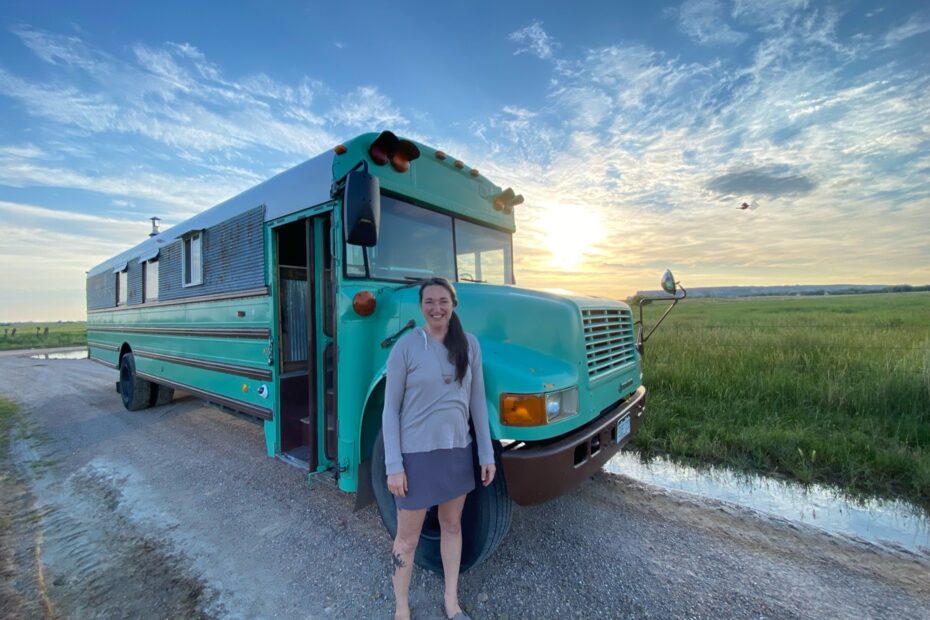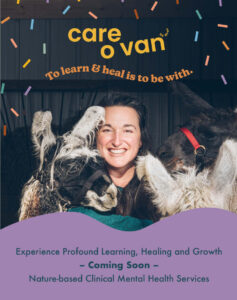A Mobile Mental Health Service Platform
Redefining Healthcare is a community effort, and we are honored to help cultivate a healthier community by sharing helpful, relatable information and resources from our members and the local health and wellness community at large to encourage healing and personal wellbeing.
Recently, the Table Health team learned of a new, nature-based clinical mental health service, Care O Van and the woman driving this profound learning experience for healing and growth, Megan Mertaugh-Graber, M.Ed, MSW, LICSW.
We recently caught up with Megan to learn more and share about her area of expertise and how she shares her approach to health and wellness with supportive community offerings and services.
Q. What is your full name, title, and area of expertise?
A. My full name is Megan Mertaugh-Graber, M.Ed, MSW, LICSW
○ M.Ed: Master of Education specializing in Youth Development Leadership as well
as Animal-Assisted Services
○ MSW: Master of Social Work specializing in Clinical Mental Health, youth and
families, as well as Integrative Therapies and Healing Practices
○ LICSW (MN License), Licensed Independent Clinical Social Worker
○ LLMSW (MI License), Limited Licensed Master Social Worker
○ LMSW (MI License in process/pending), Licensed Master Social Worker
I work to serve children and their families, adolescents, adults, caregivers, foster care providers, and school staff.
My areas of expertise include facilitating clinical, research informed, mental health services through the implementation of integrative therapies and healing practices, animal-assisted services, and nature-based therapies.
I specialize in experiences and struggles pertaining to: chronic stress and trauma, intergenerational and early childhood trauma, emotional/behavioral difficulties, developmental delays and interference, postpartum and parenting struggles, incest and sexual abuse, LGBTQ-IA2S+, gender and sexual identity diversity, relational harm, grief, loss, and mourning, addictions, conflict, transitions, and change.
Q. In regard to your area of expertise, what does a typical session look like? What can your clients expect?
A. Care-O-Van provides services that facilitate access to engaging indoor & outdoor environments, as well as ways of relating to and communication with others that goes beyond verbal language and traditional modes of expression. By incorporating the arts, nature and animals as partners within Care-O-Van’s facilitation of purposeful learning & healing services, children, individuals and families have access to more relational and experiential tools through which to express, make sense of and repair their experiences within a therapeutic environment,in addition to the tools of verbal expression.
I facilitate a variety of psychotherapy methods, in order to offer diverse and multifaceted, nonverbal and verbal pathways through which individuals can explore, communicate, experience and express themselves, and their relationship with the world.
Depending on an individual’s needs and preferences of engaging in different methods and modes of experience and expression, they may prefer or prefer not to include animals as co-facilitators of and partners within your therapeutic experience. That is absolutely okay! I am here to advocate for an individual’s sense of safety, health, learning and healing. Whether services take the shape of working predominantly with llamas and/or chickens and a bunny, during some sessions and not others, or not at all, my commitment is to remain fluid in supporting them and their therapeutic experience by facilitating a range of experiential therapy techniques and activities as a multidimensional approach towards learning, healing and personal growth
Traditional therapy typically continues to look like sit down, talk therapy, which requires children and individuals to be able to verbally express themselves and their experiences in ways they might not have the developmental capacity or words for yet within a sterile office environment. Many of our experiences are embodied and visceral, lacking language to make sense of the experience, especially for young children just learning language.
Children, families and individuals with whom I work, will walk away with embodied experiences of learning and healing, that are purposefully facilitated by myself in relationship with nature, animals and the arts. Individuals will be walking away with an increased sense of connectedness, relationship, safety, acceptance and being witnessed by others.
Q. Is there an introductory exercise or reflection you can walk us through to tap into the possibilities of healing through your service and area of expertise?
A. A relational activity I often facilitate in session, as well as introduce and coach with caregivers to do at home with their children, is the ‘Feather Pass.’ The only item needed for this activity is one feather.
To start, the caregiver holds the feather in the palms of their hands, placed together like a small plate/bowl. The caregiver asks if their child is ready for them to pass the feather. Then the caregiver takes an intentional big breath in, and blows the feather over to their child. It is important to place emphasis in this activity on breathing, relating with each other, and having fun. The goal is not to necessarily catch the feather successfully. The goal is to see, hear and be with each other in the present moment, have fun, try again, to breathe deeply, and laugh together if the feather becomes sneaky in the passing and cannot be caught.
For a caregiver to model a non judgemental stance toward themselves and their child(ren), that it is okay no matter what, whether the feather is tricky to pass or hard to catch, the relational play, and coregulatory joining in being with and breathing together is the ultimate desired outcome.
Q.How can individuals apply your practice during times of uncertainty
A. During these times of uncertainty and plethora of elevated stressors, it has become increasingly complicated to be in relationship with others. Moreover the chronic and increased levels of stress, can exasperate any efforts and energy remaining to invest in attuning to the needs of our children, ourselves and others within our communities, and to respond with empathy and gentleness towards the self and others. For this reason, slowing down matters, less becomes more, and the small, quiet, relational moments that can be typically overlooked for their significance, speak volumes in how to feed and nourish the soul.
Applying and practicing doing one thing at a time is a skill. This skill can enhance a sense of accomplishment and control when so much feels uncertain and out of control, help curb the overwhelming paralysis of the to-do list, decelerate the intake and impede the pervasiveness of other’s voices, opinions, posts and news, and enable the creation of just enough space to allow for one to hear one’s own voice and need. This self space is there, if we can find ways to access and defend it.
Oftentimes, the most accessible acts of grounding that engage our senses can help one take notice of and reconnect with that relational self space. Examples of these acts of grounding include purposefully: running one’s hands under running water, applying lotion to the body, drinking something hot or cold, touching something soft or textured, holding an ice cube for a few seconds, opening the door to take a few breaths of outside air, preserving a moment to push out against the frame of the doorway before walking through, looking at a rock or random item in the house to notice all the little details it entails, smelling or applying a preferred scent to the body, ringing a bell and listening to the volume dissipate.
Finding what works to help one slow down enough to access that space is different for everyone, and can vary from what works and what doesn’t moment to moment. What is important is to remain gentle with one’s self, and explore ways through which to enter that space, that are simple, easily accessible, and do not take more time than a few seconds to minutes to complete. The goal is to gain a sense of pause and control amidst these times of uncertainty, in order to decipher what the self’s need is and what the most helpful next step may be to meet that need, in order to respond with more deliberate intention towards ourselves, our children and others.
Q. What kind of feedback do you regularly hear from clients?
A. Families with whom I have worked with have regularly expressed that their child feels a significant and uniquely strong and secure bond with me within our therapeutic relationship and work together, and that their child will eagerly await as well as show excitement for the days when we meet together for their therapy session. What makes my heart burst are the little notes and hand drawn pictures from kiddos, who will repeatedly slip notes/drawings under my office door (when I was located within a school setting), to share their care for our relationship and/or ask to eat lunch with me or for when their next session is scheduled. Caregivers regularly highlight their appreciation for my advocacy for their child and/or family, in partnering within the school environment to support their child’s learning and/or navigate barriers and struggles they may face in childcare settings and other social and learning environments. Teachers frequently express gratitude for the insights I share, in regards to interpreting and responding to behaviors bubbling up within their classroom, as well as for the ability to team together in providing a higher level of informed support.
Q. How can our readers connect with you? Learn from you?
A. To learn more, please visit Care-O-Van’s website for more information and to connect with me: www.careovan.com.
You can also connect with me via Care-O-Van’s social media platforms, which include Instagram, Facebook and Tiktok:
Instagram: www.instagram.com/careovan/
Facebook: www.facebook.com/thecareovan/
Tiktok: www.tiktok.com/@careovan?
Anyone can reach me directly by emailing: hello@careovan.com.


